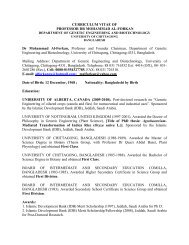Engineering: issues, challenges and opportunities for development ...
Engineering: issues, challenges and opportunities for development ...
Engineering: issues, challenges and opportunities for development ...
Create successful ePaper yourself
Turn your PDF publications into a flip-book with our unique Google optimized e-Paper software.
ENGINEERING FOR DEVELOPMENT: APPLICATIONS AND INFRASTRUCTUREreduce the overall dem<strong>and</strong> <strong>for</strong> personal vehicle use, particularlyby encouraging public transport. Modifying unsustainabletransportation energy consumption patterns will requirepolitically difficult cultural adjustments.There is great urgency to design <strong>and</strong> implement measures <strong>for</strong>both mitigation <strong>and</strong> adaptation towards unavoidable climatechange effects, including upgrading infrastructure to withst<strong>and</strong>the impacts of extreme weather events <strong>and</strong> ‘climate proofing’ ofnew projects. Development, deployment <strong>and</strong> diffusion of lowcarbonenergy technologies, together with energy efficiency,renewable energy <strong>and</strong> cleaner <strong>and</strong> advanced technologies <strong>for</strong>energy supply, will require intense engineering ingenuity.© GFDL - Wikimedia - Lycaon Offshore wind turbines have enormous potential in many partsof the world.ciency <strong>and</strong> economy is fundamental to reducing greenhousegas emissions, <strong>and</strong> is increasingly important <strong>for</strong> the financialeconomy with the cost of energy rising around the world.Many energy efficient technologies however require the useof more complex <strong>and</strong> uncommon systems <strong>and</strong> materials <strong>and</strong>have long pay-back times; these are important considerationsbe<strong>for</strong>e they can be viable <strong>for</strong> the population at large.At present, the cost of energy from renewable <strong>and</strong> sustainablesources is higher than the cost of energy from non-renewable<strong>and</strong> unsustainable sources (although this is the subject ofdebate). Renewable sources (such as solar photovoltaic, wind<strong>and</strong> hydropower), even without the benefit of economies ofscale, are ideal <strong>for</strong> use in situations where the energy dem<strong>and</strong>is growing slowly or in places far from high-consumption centres.<strong>Engineering</strong> ef<strong>for</strong>ts are currently needed to lower the costof renewable generation <strong>and</strong> also to find feasible technologies<strong>for</strong> renewable energy storage (such as hydrogen fuels cells) <strong>and</strong>distribution (such as distributed generation <strong>for</strong> small-scalerenewable sources).In the transportation sector, actions <strong>for</strong> promoting cleanerfuels <strong>and</strong> vehicles must be complemented by policies toIndustrial <strong>development</strong> requires secure, sustainable energy <strong>and</strong>this specifically applies to the economies of developing countries.Energy efficiency is to be considered indispensable toenhancing industrial <strong>development</strong>. For addressing the seriousproblem of urban air pollution as well as problems of climatechange, the use of cleaner energy technologies <strong>and</strong> renewableenergy will be essential. Ensuring industrial competitivenessrequires building the required infrastructure, including theenergy supply, transport availability, trained manpower <strong>and</strong>environmental regulatory systems. Special capacity-buildingef<strong>for</strong>ts will be required to provide engineering professionalswith up-to-date knowledge on the diverse technologies <strong>for</strong>sustainable energy generation.<strong>Engineering</strong> <strong>and</strong> civil societySociety <strong>and</strong> decision-makers must realize that analysis of thefeasibility <strong>and</strong> the technological availability of energy optionsis necessary in any technical <strong>and</strong> engineering issue.There is no uni<strong>for</strong>m treatment <strong>for</strong> solving globally sustainableenergy problems. Recognition of technical facts related tothe <strong>development</strong> situation of different countries is requiredto achieve realistic <strong>and</strong> sustainable energy solutions.Energy options to solve problems of sustainable <strong>development</strong>cannot be selected on the basis of doctrine or ideology.Scientifically sound <strong>and</strong> thoroughly engineered solutionsare the only way to address the problems of energy sustainability.The engineering profession is continuously generating newknowledge <strong>and</strong> adapting to new <strong>challenges</strong>. The engineeringprofession is, every day, anticipating, planning <strong>and</strong> preparing<strong>for</strong> these <strong>challenges</strong>. However, better engagement is stillneeded with civil society in general, industry <strong>and</strong>, in particular,all levels of government to respond to the energy <strong>challenges</strong>facing humankind.291

















